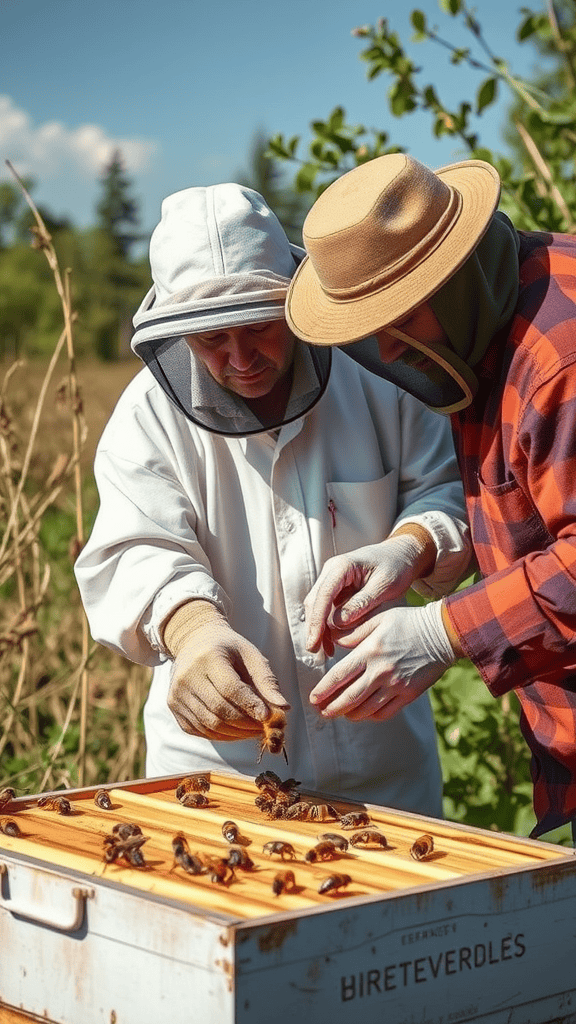Understanding Beekeeping: Essential Techniques for Beginners
Beekeeping is an age-old practice that not only supports the environment by aiding pollination but also can be a rewarding hobby. Whether you want to produce your own honey or contribute to the local ecosystem, getting started can be quite exciting. Here, you’ll learn essential techniques for beginners eager to delve into beekeeping.
Understanding Bee Behavior
Before you dive into beekeeping, it’s vital to grasp the basic behavior of bees. Each bee has a role in the colony: the queen, drones, and worker bees. The queen lays eggs, drones mate with her, and worker bees gather food and maintain the hive. Familiarizing yourself with these roles will help you manage your hive effectively.
Choosing the Right Equipment
Your beekeeping journey begins with the right equipment. Here’s a checklist of essential tools:
- Bee Suit: Protects you from stings.
- Gloves: Keeps your hands safe while working with bees.
- Hive Tool: Helps frame manipulation and inspections.
- Smoker: Calms bees during inspections.
- Bees: You can buy a package of bees or a nucleus colony to start your hive.
Investing in quality equipment will make your beekeeping experience much smoother.
Finding the Perfect Location
The site where you place your hive is crucial for successful bee management. Consider these factors:
- Sunlight: Bees thrive in warm environments, so choose a spot with morning sun.
- Water Access: Ensure bees have access to water nearby.
- Wind Protection: Place hives near fences or hedges to shield from strong winds.
Your bees will be most productive in a comfortable and safe environment.
Learning About Hive Management
Hive management involves regular inspections. Check your hive every 7–10 days during the active season. Look for:
- Signs of queen presence and egg-laying.
- Honey supply levels.
- Signs of pests or diseases.
Conduct inspections efficiently to minimize stress on the bees. Maintaining your hive also means knowing when to add new supers (additional boxes for honey storage) and how to manage swarming behavior.
Understanding Honey Production
As you get comfortable with hive management, you will likely want to harvest honey. This process involves:
- Timing: Harvesting usually occurs late summer when honey stores are plentiful.
- Using a Honey Extractor: This tool efficiently extracts honey from frames without damaging the bees’ work.
- Filtering and Bottling: Once extracted, filter the honey to remove wax particles and bottling keeps it fresh for consumption.
Always be mindful of leaving enough honey for the bees to survive the winter.
Staying Informed and Connected
The world of beekeeping is vast and constantly evolving. Joining a local beekeeping club is a fantastic way to enhance your knowledge. You can meet fellow beekeepers, share experiences, and even find mentors. Online resources also offer a wealth of information, with forums and websites dedicated to beekeeping enthusiasts.
Understanding Ongoing Maintenance
Beekeeping doesn’t end with setting up your hive. Regular maintenance is essential for a healthy bee colony. This includes:
- Feeding bees in winter to ensure they have enough resources.
- Monitoring for parasites like Varroa mites, and taking necessary control measures.
- Keeping records of your inspections and honey production for future reference.
Consistent care will lead to a thriving colony.
Getting into beekeeping as a beginner is rewarding for both the individual and the environment. With the right knowledge, equipment, and dedication, you can contribute to the ecosystem and enjoy the sweet rewards of your labor. Embrace the journey of learning and enjoy your time with the bees!
The Importance of Bees: Benefits of Beekeeping for the Environment and Agriculture
Bees are often overlooked, yet they play a crucial role in our ecosystem. These small creatures are vital for pollination, which is essential for producing fruits, vegetables, and many other crops. When you think about the importance of bees, you might not realize that beekeeping is a significant practice that supports both the environment and agriculture. Understanding the benefits of beekeeping can shine a light on why these tiny insects deserve our protection and appreciation.
The Role of Bees in Pollination
One of the primary functions of bees is pollination. This process involves transferring pollen from the male part of a flower to the female part, allowing plants to reproduce. Many crops rely on bees for this essential task. Here’s how bees contribute to pollination:
- Increased Crop Yields: Research shows that crops pollinated by bees can yield up to 30% more than those that aren’t.
- Diversity of Plant Life: Bees help in the pollination of a wide variety of plants, which promotes biodiversity and healthy ecosystems.
- Quality of Produce: Fruits and vegetables pollinated by bees often have better quality and taste.
Environmental Benefits of Beekeeping
Beyond agriculture, beekeeping provides numerous environmental advantages that are often ignored. Here are some key points to consider:
- Supporting Biodiversity: Beekeeping encourages the growth of wildflowers and other plants by promoting pollinator populations.
- Stabilizing Ecosystems: Healthy bee populations are crucial for balanced ecosystems. They contribute to the survival of various plant species that other animals depend on.
- Combating Climate Change: By supporting local flora, bees play a role in carbon absorption, which helps mitigate climate change.
Economic Impact of Beekeeping
Beekeeping is also an economic powerhouse that can benefit local communities and farmers. Many people may not think of bees as a source of income, but here’s how they can make a difference:
- Pollination Services: Farmers often pay beekeepers for the pollination services of their hives, which can significantly increase agricultural profits.
- Honey Production: Beekeepers can also harvest honey, beeswax, and other products for sale, providing additional income.
- Employment Opportunities: Beekeeping encourages jobs in rural areas, which can help strengthen local economies.
How Beekeeping Affects Nutrition
Bees contribute not only to agriculture but also to nutrition. They help in growing plants that provide essential nutrients for a healthy diet. Here’s how their role in beekeeping impacts nutrition:
- Diverse Food Options: By pollinating various crops, bees help ensure a diverse diet with fruits, vegetables, and nuts.
- Healthy Living: Eating a balanced diet rich in bee-pollinated foods contributes to better health outcomes.
Importance of Bee Conservation
As much as we recognize the importance of bees, it is equally essential to address their declining populations. Factors like pesticide use, habitat loss, and climate change threaten bees, and thus it’s vital for everyone to get involved. Here are some actions you can take to support bee populations:
- Plant Bee-Friendly Flowers: Create gardens with flowers that attract bees, such as sunflowers, lavender, and wildflowers.
- Reduce Pesticide Use: Limit or eliminate the use of harmful chemicals in your garden.
- Support Local Beekeepers: Purchase honey and other bee products from local beekeepers to promote sustainable practices.
The role of bees in our environment and agriculture is undeniable. The practice of beekeeping not only supports these important insects but also enhances our ecosystem, improves crop yields, and promotes economic prosperity. By appreciating and investing in beekeeping, we can contribute to a healthier planet and better food systems for all.
Conclusion
Embracing the world of beekeeping opens up a myriad of possibilities for you, whether you’re looking to produce your own honey, boost the health of local ecosystems, or explore a fulfilling hobby. Understanding the essential techniques is key to ensuring that your bees thrive, which involves learning about hive management, bee behavior, and proper maintenance. With this knowledge, you’ll be well on your way to fostering a healthy and productive colony.
The benefits of bees extend far beyond the delicious honey they produce. Bees play a critical role in pollinating countless crops, contributing significantly to both the environment and agriculture. By keeping bees, you are not only supporting local biodiversity but also enhancing food security through increased crop yields. Engaging in beekeeping can also instill a greater appreciation for nature and the intricate relationships that exist within it.
As a beginner, remember that every beekeeper was once a novice, and the journey offers vast learning opportunities. Surround yourself with a community of experienced beekeepers and resources that can guide you along the way. Starting your beekeeping adventure can be a rewarding experience that nourishes both your personal growth and the natural world around you. With time, patience, and dedication, you will not only cultivate a thriving hive but also make a meaningful impact on your environment. So, gather your equipment, dive into learning, and enjoy the sweet rewards that beekeeping has to offer!
As an Amazon Associate, I earn from qualifying purchases.

